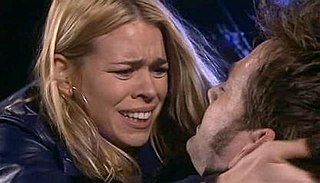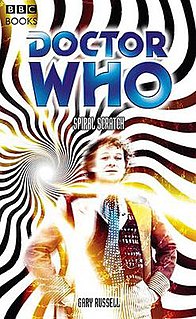
The Daleks are a fictional extraterrestrial race of mutants principally portrayed in the British science fiction television programme Doctor Who. The Daleks were conceived by science-fiction writer Terry Nation and first appeared in the 1963 Doctor Who serial The Daleks, in the shells designed by Raymond Cusick.

Gallifrey is a fictional planet in the long-running British science fiction television series Doctor Who. It is the original home world of the Time Lords, the civilisation to which the main character, the Doctor, belongs. It is located in a binary star system 250 million light years from Earth.
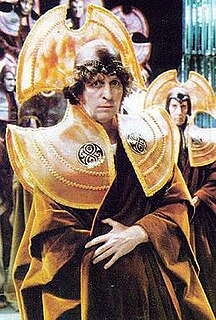
The Time Lords are an ancient extraterrestrial species in the British science fiction television series Doctor Who, of which the series' title character protagonist, the Doctor, is a member. Time Lords are so named for their command of time travel technology and their non-linear perception of time. Originally they were described as a powerful and wise race from the planet Gallifrey, from which the Doctor was a renegade; details beyond this were very limited for the first decade of the series. They later became integral to many episodes and stories as their role in the universe developed. For the first eight years after the series resumed in 2005, the Time Lords were said to have been destroyed during the Last Great Time War at some point between the original series' cancellation in 1989 and the show's revival. In 2013, the 50th anniversary special "The Day of the Doctor" concerned this supposed destruction and their eventual survival.

The Master is a recurring character in the British science fiction television series Doctor Who and its associated spin-off works. The character is a renegade alien Time Lord and the archenemy of the title character the Doctor.

Skaro is a fictional planet in the British science fiction television series Doctor Who. It was created by the writer Terry Nation as the home planet of the Daleks.

The Cybermen are a fictional race of cyborgs who are among the most persistent enemies of the Doctor in the British science fiction television programme Doctor Who. Within the context of the series, the Cybermen are a species of emotionless space-faring cyborgs who convert human beings to join and populate their ranks. First appearing in 1966, the Cybermen were created by Dr. Kit Pedler and story editor Gerry Davis.

The Silurians are a race of reptile-like humanoids in the long-running British science fiction television series Doctor Who. The species first appeared in Doctor Who in the 1970 serial Doctor Who and the Silurians, and were created by Malcolm Hulke. The first Silurians introduced are depicted as prehistoric and scientifically advanced sentient humanoids who predate the dawn of man; in their backstory, the Silurians went into self-induced hibernation to survive what they predicted to be a large atmospheric upheaval caused by the Earth capturing the Moon.

Doctor Who Magazine is a magazine devoted to the long-running British science fiction television series Doctor Who. Its current editor is Marcus Hearn, who took over from the magazine's longest-serving editor, Tom Spilsbury, in July 2017. It is currently recognised by Guinness World Records as the longest running TV tie-in magazine.

UNIT is a fictional military organisation from the British science fiction television series Doctor Who and its spin-off series Torchwood and The Sarah Jane Adventures. Operating under the auspices of the United Nations, its purpose is to investigate and combat paranormal and extraterrestrial threats to the Earth. In the original Doctor Who series, several UNIT personnel played a major role in the programme.
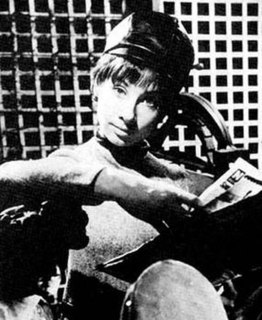
Susan Foreman is a fictional character in the British science fiction television series Doctor Who. The granddaughter and original companion of the First Doctor, she was played by actress Carole Ann Ford from 1963 to 1964, in the show's first season and the first two stories of the second season. Ford reprised the role for the feature-length 20th anniversary episode The Five Doctors (1983) and the 30th anniversary charity special Dimensions in Time (1993).

Steven Taylor is a fictional character played by Peter Purves in the long-running British science fiction television series Doctor Who. A space pilot from Earth in the future, he was a companion of the First Doctor and a regular in the programme from 1965 to 1966. Steven appeared in 10 stories. Only three of the serials in which Steven appeared as a regular are complete in the BBC archive.
The Daleks are a fictional extraterrestrial race of mutants from the British science fiction television series Doctor Who. The mutated remains of the Kaled people of the planet Skaro, they travel around in tank-like mechanical casings, and are a race bent on universal conquest and destruction. They are also, collectively, the greatest alien adversaries of the Time Lord known as the Doctor, having evolved over the course of the series from a weak race to monsters capable of destroying even the Time Lords and achieving control of the universe.
The Time War, more specifically called the Last Great Time War, is a conflict within the fictional universe of the British science fiction television series Doctor Who. The conflict pitted the Time Lords against the Daleks and culminated in the apparent mutual destruction of both races, caused by the Doctor.

Mars, the fourth planet in the solar system, has been featured in the Doctor Who fictional universe on a number of occasions. In the various Doctor Who serials which feature the Ice Warriors, mention is made that Mars is their homeworld.

Harriet Jones is a fictional character played by Penelope Wilton in the long-running British science fiction television series Doctor Who. Having worked previously with lead writer and executive producer Russell T Davies, Wilton was keen to involve herself with his 2005 revival of Doctor Who after he sought to cast her. Jones is introduced in the two-part story "Aliens of London" and "World War Three" as a Member of Parliament who aids the Ninth Doctor against an alien invasion of London. The episode introduces a running joke associated with the character which would see her frequently introduce herself by holding up her ID and stating her name and rank; in subsequent episodes this was usually met with the response "Yes, I/we know who you are," even occurring with the Daleks and the Sycorax.
The Cartmel Masterplan is a fan name for the planned Doctor Who backstory developed primarily by Andrew Cartmel, Ben Aaronovitch and Marc Platt, by which they intended to restore some of the mystery of the Doctor's background that had been lost through revelation of the existing backstory. Although hints were dropped in the last two seasons, the proposed revelations never materialised on screen as the programme was not renewed for another season in 1990.
The Time Lords are a fictional humanoid species originating on the planet Gallifrey, seen in the British science fiction television series Doctor Who. Time Lords are so called because they are able to travel in and manipulate time through prolonged exposure to the time vortex.
The Constellation of Kasterberous is a fictional Star System in the Dr Who Television franchise, best known as the site of the fictional planet Gallifrey.

"Journey's End" is the thirteenth and final episode of the fourth series of the British science fiction television series Doctor Who, which was first broadcast on BBC One on 5 July 2008. It is the second episode of a two-part crossover story featuring the characters of spin-off shows Torchwood and The Sarah Jane Adventures, preceded by "The Stolen Earth", which aired on 28 June. At 65 minutes in length, it was approximately 20 minutes longer than a standard fourth series episode. It marked the final regular appearance of Catherine Tate as Donna Noble.
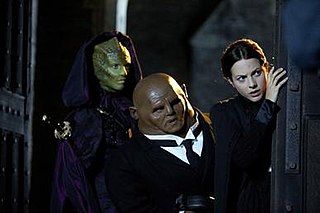
Madame Vastra, Jenny Flint, and Strax, are a trio of recurring fictional characters in the British science fiction television series Doctor Who, created by Steven Moffat, and portrayed, respectively, by Neve McIntosh, Catrin Stewart and Dan Starkey.


